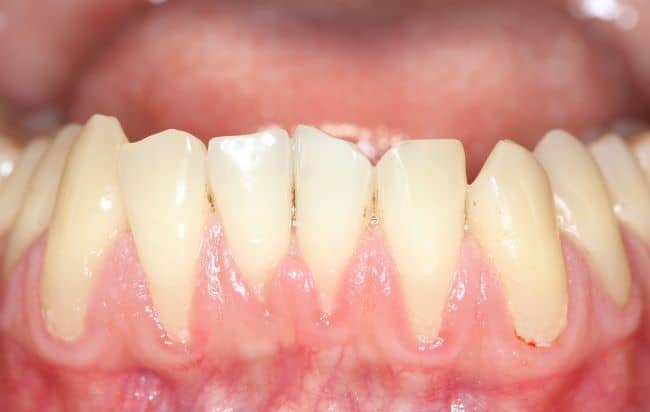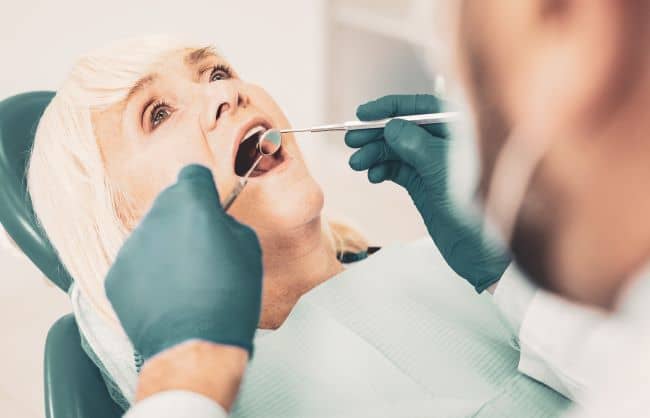Are Root Stumps and Decayed Teeth Painful?
Teeth decay on the root’s surface, also known as root cavities, root decay, or root caries, is an oral health issue that can lead to serious health effects.
Here, we’ll discuss how tooth decay can lead to gum recession and exposed root surfaces, and why the issue requires immediate attention to prevent health complications.
Teeth Decay on Root Surfaces
While tooth enamel is quite tough and generally resistant to cavities, the root surface lacks the hard, thick, protective covering enamel has. If the gums recede or pull away from the tooth, it can create an exposed tooth root.
This can create pockets where plaque and bacteria build, leaving the root surface more vulnerable to decay, cavities in teeth, a rotten tooth, tooth abscess, gum disease, and various other oral health issues.
Possible symptoms of teeth decay include:
- An exposed tooth root often makes it uncomfortable to consume hot or cold food or drinks due to increased sensitivity
- Black lines on teeth or discoloured spots
- A constant, dull toothache
- Sharp or severe tooth pain
- Pain or discomfort when chewing
- Gum swelling and redness
- A tooth that feels loose
- Gum recession
- A rotten tooth will look like a brownish/blackened stump (this is the advanced stages of teeth decay)
- Pits or holes, indicating cavities in teeth
- Cracks or breaks in the tooth enamel
- Discoloured tooth enamel
- Sore or infected gum tissue near the affected or rotten tooth
- Bad Breath
Common Causes of Gum Recession and Cavities in Teeth
A variety of factors can lead to gum tissue recession, leaving teeth especially vulnerable to decay.
Common causes of teeth decay and gum recession include:
- Poor Oral Hygiene – Without consistent daily brushing and flossing, plaque can build and lead to decay.
- Age – Older individuals are more susceptible to various oral health concerns, including exposed root surfaces and gum recession.
- Genetics – Age-related gum recession, weak tooth enamel, and periodontal disease often run in families.
- Crooked Teeth – Teeth that are out of alignment can have areas that are difficult to clean and particularly prone to decay.
- Overly Aggressive Brushing – Using a hard-bristled toothbrush or brushing aggressively can damage enamel and gum tissue.
- Diabetes – This condition can increase inflammation in soft tissues, weaken the immune system, and lead to more severe gum disease and gum recession.
- Medications – Certain over-the-counter or prescription medications cause dry mouth as a side effect, leading to an increased risk of oral health concerns such as tooth decay and gum disease.
- Tobacco Usage – Using chewing tobacco, smoking cigarettes, smoking cigars, dipping, or using any tobacco products damages teeth, causes dry mouth, increases the risk of gum disease, and weakens enamel.
- Trauma – An injury to the teeth or gums can allow bacteria to spread and accumulate along the gum line.
- Periodontal Disease – Untreated gum disease increases the depth of periodontal pockets, leaving space where bacteria and plaque can accumulate. Overgrowth of plaque and bacteria can then cause the gums to recede and lead to exposed tooth roots.
- Excess Sugar – Certain types of bacteria are good and work to fight decay. However, these good bacteria cannot do their job if an individual does not brush properly and consumes too much sugar.
- Inhalers – Asthma medications containing acidic powder can lead to weakened tooth enamel. If you use an inhaler, it is crucial to brush your teeth properly twice a day.
Treatment for Cavities in Teeth and Gum Recession
Your dental professional will evaluate your oral health to pinpoint the root cause of your gum recession and the extent of your teeth decay. Based on these findings, a personalised treatment plan will be created.
Common treatments for an exposed tooth root, cavities in teeth, and gum recession include:
- Periodontal therapy to remove plaque and tartar and help the gum tissues heal and promote reattachment to the tooth’s surface
- Tooth coloured fillings
- A root canal
- Tooth extraction and replacement, for severe cases of decay or a rotten tooth
- Antibiotics
- Surgical gum grafting to protect the exposed tooth root from further damage
- Improved preventative care, including regular dental checkups, instruction on a home oral hygiene routine, toothpaste recommendations, and proper brushing and flossing technique
- Dental restoration with fillings or crowns
How to Prevent Teeth Decay
- See Your Dentist for Regular Checkups – The key to treating teeth decay is catching it early. Regular visits with your dentist, at least once to twice a year, ensure that mild decay can be recognised and treated before it progresses into further decay, infection, or a rotten tooth
- Practice Good Oral Hygiene – One of the best ways to prevent cavities in teeth is to follow a good oral hygiene regime. Brush your teeth at least twice a day for two minutes with fluoride toothpaste and floss at least once a day.
- Limit Sugar Intake – It is important to pay attention to your sugar intake and make efforts to minimise it. If you do have something sweet, make sure to rinse your mouth out with water and brush your teeth properly soon after.
- Use Mouthwash – Consider using a mouthwash containing fluoride once or twice a day as part of your oral hygiene routine.
- Don’t Share Germs – Did you know that cavities are contagious? The bacteria responsible for cavities, Streptococcus mutans, is contagious, making it important to avoid sharing utensils or food with other people, even your own family.
What Happens If I Ignore Teeth Decay?
Oral health issues can worsen with time and require more expensive, invasive treatment. It is imperative to treat gum disease, cavities, and decay early before they develop into a rotten tooth, gum recession, or an infection that can affect the entire body.
Side effects of advanced teeth decay, gum recession, and exposed tooth roots include:
- Bad Breath – Decayed teeth can give off a foul odour
- Low Energy – Teeth decay can steal energy from the body’s reserves, leaving an individual feeling more fatigued
- Decreased Self-Confidence – Rotten teeth can lower an individual’s self-confidence and cause them to limit socialising
- Changes in Appetite – Rotten teeth make it difficult to appreciate certain foods
- Pain – Infections from tooth decay can result in severe pain
- Sepsis – A blood infection from bacteria in the infected tooth entering the bloodstream
The Importance of Regular Checkups for Elderly Individuals
The early stages of gum disease often go unnoticed, making it imperative to see your dentist regularly before complications develop. Unfortunately, elderly patients may not receive the dental care they need and deserve.
Whether they are physically incapable of travelling to a traditional dentist, uncooperative during appointments, or dealing with dental phobia, elderly patients often go without proper dental care even though they are at an increased risk of oral health complications.
At Aged Care Dentistry, we recognised this problem and dedicated our entire practice to ensuring everyone receives high-quality dental care. Our fully equipped mobile unit contains everything we need to provide the highest quality mobile dental care in the comfort of a patient’s residence. We’re also experienced in mobile sedation dentistry for patients who are afraid of dental treatment or are uncooperative during procedures.
If you have oral health concerns for yourself or your loved one, we invite you to reach out to our caring team. We would be happy to answer any questions or set up a consultation.


